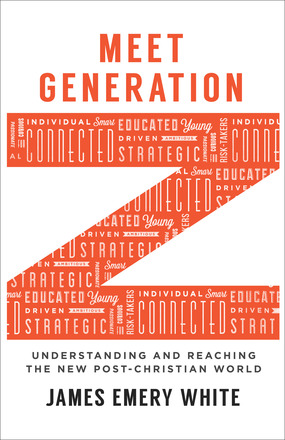 When the UPS guy delivers a box of books, I’m always excited. When I opened it and found a review copy of Meet Generation Z, I was motivated. Several people had recommended this book to me and I was anxious to read it.
When the UPS guy delivers a box of books, I’m always excited. When I opened it and found a review copy of Meet Generation Z, I was motivated. Several people had recommended this book to me and I was anxious to read it.
James Emery White is a former president of Gordon-Conwell Theological Seminary and is the founding pastor of Mecklenburg Community Church in Charlotte. The growth of his church (Meck) among young people has always suggested that he has his finger on the pulse of emerging generations.
Meet Generation Z represents White’s effort to help the church understand and engage with those born between 1995 and 2010. Generation Z is under 25 years old today, but by 2020 they will account for 40% of all consumers.
Many of their formative years were shaped by the Great Recession years, they have never known life without Hybrid cars, and they consider wifi to be an entitlement, not a luxury.
Most important for the church is to realize that Generation Z needs to hear the gospel. This generation is growing up in a post-Christian America and many of them function with little to no cultural memory of Christianity. They are spiritually illiterate.
White’ books is important because it opens a window into the world of this emerging generation and it charts a course to reach them with the gospel.
Through the course of 8 chapters, white covers much ground. He dabbles in the ages that make up the flow of world history, the sociology of generations, evangelism, apologetics, and challenges for the contemporary church.
This book is very helpful. The first chapter alone, which is an argument that the world is entering into a seventh age of history, is worth the price of the book. In fact this book is so helpful, I’m calling it a “must read” for pastors and churches who want to reach Generation Z and for anyone interested in understanding the changing shape of evangelism and gospel interaction in 21st Century America.
Quotable:
- “The great crisis of the seventh age is that there has been a second fall. The first fall led to God’s expulsion of human beings from the Garden of Eden. The second fall was when we returned the favor. In our world, increasing numbers of people lead their lives without any sense of needing to look to a higher power, to something outside of themselves. Leaders of science and commerce, eduction and politics–regardless of their personal views–do not tend to operate with any reference to a transcendent truth, much less a God.”
- “In 1994, 62 percent of Americans attended a church frequently. In 2013, barely half attended more than seldom or never.”
- “Some are calling Generation Z the last generation we will ever speak of. The speed of culture, in which change can happen in a day, will make speaking of generations and their markings obsolete.”
- “For Generation Z, the idea of ‘acceptance’ is often interchangeable with the idea of ‘affirmation.'”
- “To be truly countercultural begins with being truly Christlike.”
- “The new source of revelation is personal fulfillment.”
- “We do not gain the world’s attention through compromised voice, but through a prophetic one.”
- “Without the prophetic voice, there is no gospel. Without a sense of the true nature of our sin condition, which demands an understanding of sin itself, there is no good news. Without the prophetic voice, the evangelistic voice is mere sentimentality. Or worshippers, just cheap grace.”
- “The church must view evangelism as both a process and an event.”
- “Whatever it is we are attempting to convey, much less explain, will need to be communicated more frequently in shorter bursts of ‘snackable content.’ Why? Because members of Generation Z are the ‘ultimate consumers of snack media. They communicate in bite sizes.'”
- “Perhaps the most defining mark of members of Generation Z, in terms of their spiritual lives, is their spiritual illiteracy.”
- “What is killing the church today is having the mission focused on keeping Christians within the church happy, well fed, and growing.”

